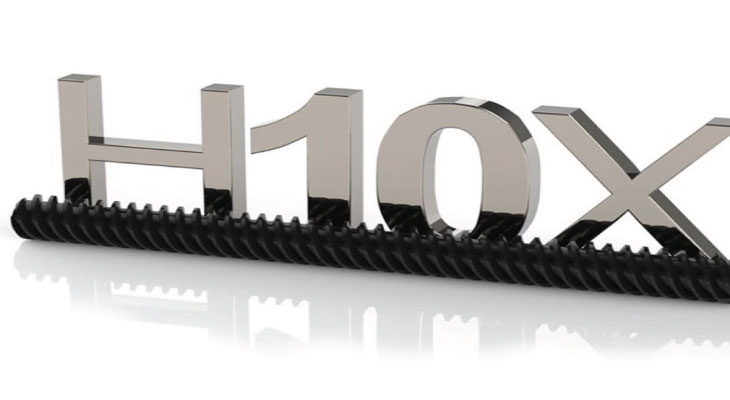The Top Five Benefits of PTFE Coating Your Acme Screw

If you're an engineer, you already know how vital lubrication is to the long-term performance and reliability of lead screw assemblies. Lubrication repels water, provides corrosion resistance, and lowers the coefficient of friction. A reduced coefficient of friction leads to a smoother running lead screw assembly, lower drag torque, and less heat generation, which generally means a longer design life. Conversely, an absence of lubrication potentially leads to erratic drag torques and unpredictable wear that can cause an assembly to fail.
One type of lubrication that we're pleased to offer on all Helix lead screws is PTFE (Polytetrafluoroethylene). Specifically, we provide lead screws that are coated in the fluoropolymer material. PTFE molecules are long chains of carbon atoms surrounded by fluorine atoms. Fluorine atoms have a high electro-negativity, which means that the fluorine atoms do not like to be near any other atoms, so the other atoms are repelled. This property makes a PTFE coated surface non-reactive, non-stick, and have a low coefficient of friction.
Helix PTFE coating is a tough and durable form of dry lubrication for screw assemblies making them ideal for the medical, semiconductor, and electronics industries. However, any application can benefit from the reduced friction and corrosion resistance provided by PTFE coating.
Here's a look at the top 5 benefits of coating your acme lead screw with PTFE:
- Low Coefficient of Friction: By their very nature, lead screw assemblies involve friction. But PTFE-coated lead screws are rated a favorable 0.15 Static when it comes to the coefficient of friction, which helps extend lead screw assembly and product life. Acme screws are increasingly becoming the norm for product developers and engineers due to their increased efficiency over competing technologies, such as ball screws. Coating screws with PTFE only helps to reduce this level of friction and increase efficiency.
- Non-Stick Surface: You have probably heard of PTFE being used on pots and pans. Why? Because its non-stick properties reduce the need for fats and oils in food preparation. Many industries, such as medical device manufacturing, also benefit from a reduction/elimination of traditional oils and greases. PTFE is a dry lubricant that is non-reactive and perfect for medical and other chemically sensitive applications. This helps reduce friction, wear and tear, and energy consumption. What's more, is that these non-stick properties make lead screw assemblies easy to clean and maintain.
- Heat Resistant: Another benefit of PTFE is its temperature resistance. Helix-brand PTFE can withstand temperatures of up to 500 degrees Fahrenheit - meaning that it's an ideal application for extreme heat applications.
- Chemical Resistant: PTFE-coated screws are deemed to have "excellent" chemical resistant properties, making them ideal for use in applications where chemical reactions often occur.
- Durability: We noted this earlier, but the "toughness" of PTTE is worth mentioning again. Abrasion resistance of PTFE is rated "excellent." These tough, durable properties are mainly due to the combination of the PTFE coating with other appropriate resins to form the dry screw lubrication on the assemblies. The film components solidify during the curing process, retaining the fluoropolymer properties (i.e., non-stick). This all adds up to increased efficiency in lead screw assemblies.
While we've covered the top 5 benefits of PTFE coatings above, several other details are worth noting. Helix Linear Technologies applies PTFE coating to screw assemblies in-house. This means we control the process, the quality and keep the cost down. We typically use a coating thickness of 0.6 to 0.8 mil. The PTFE is cured by baking at over 600°F. PTFE coatings are available on all acme screws here at Helix.
Helix can manufacture PTFE coated; precision acme lead screws via thread rolling, thread milling, or thread grinding on diameter sizes from 1/8 of an inch to 6 inches.


